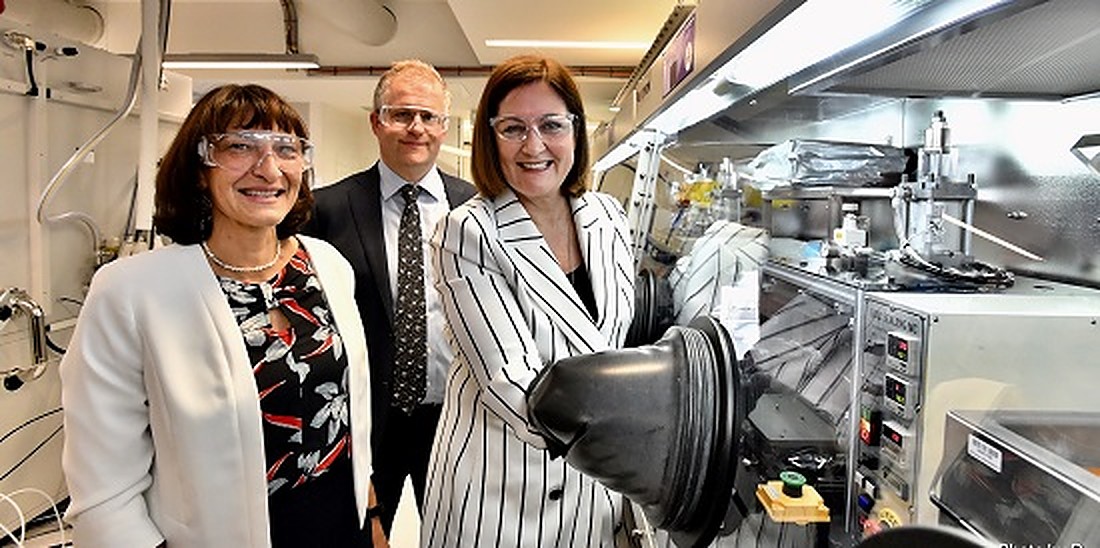A $6 million-plus hi-tech energy storage center that will seek to develop new energy storage technologies for Australia has officially opened at Deakin University on Friday. The new StorEnergy center will produce materials on a commercial scale for electrolytes and high energy density electrodes, as well as serve as an energy training hub with regular private sector interface.
By working closely with industry partners, StorEnergy researchers will design and manufacture new energy storage devices and components, including advanced Li-ion, supercapacitors, and solid-state Li and Na batteries, with improved rate capability, capacity and safety. The list of partner organizations includes Boron Molecular, CSIRO, DST Group, SupraG Energy, Calix Ltd, Sensorplex, Ionic Industries, Ciditec, Sentek, M Brodribb Pty Ltd, and Raedyne Systems.
“StorEnergy symbolises the type of partnership that Deakin is prioritising, and we believe this is the future of innovation in Australia,” said Deakin University Vice-Chancellor Iain Martin. Deakin’s StorEnergy operations will also utilise the expertise of higher education partners Monash University, Melbourne University, Queensland University of Technology and the University of South Australia.
“The facilities, processes and partnerships we have in place will equip the next generation of researchers and the energy technology workforce with the skills needed to drive innovation, exploration and investigation,” said director of the centre and Alfred Deakin Professor, Maria Forsyth. “The potential of this centre excites me as a scientist and the fact we will initially employ 15 PhD students, five research fellows and a research engineer makes me proud as this centre’s first Director.”
Deakin expects the centre to unearth knowledge and create intellectual property in advanced energy materials, batteries and battery-control systems that will help small to medium-sized businesses play a world-leading role to advance and produce new storage technologies.
StorEnergy was launched with the help of a $4.4 million Federal Government grant announced last August. Minister for Education Dan Tehan said the research conducted at the new centre represented a significant opportunity to develop new energy storage technology for Australia. “This centre will put Australia at the forefront of innovative research in energy technologies, leading to the development of new products and innovations that drive job growth, business opportunities and productivity gains,” he said.
StorEnergy will operate by integrating with Deakin’s other world-class assets including Deakin Waurn Ponds’ Battery Technology Research and Innovation Hub (Bat-TRI Hub), the Institute for Frontier Materials’ (IFM) world-class electrochemistry and NMR imaging labs, and the Centre for Advanced Design in Engineering Training (CADET). The Deakin Institute for Intelligent Systems Research and Innovation (IISRI) will also simulate and review smart grid and technology systems, while the Carbon Nexus carbon fibre and composite research centre will provide further scope for producing advanced energy prototypes.
On the on-site PV side, Deakin University is developing a $30 million smart microgrid to supply around 54% of the University’s Waurn Ponds Campus’ current power consumption. Scheduled to launch in April, the project features a 7 MW solar farm spreading across 14.5 hectares collocated with a 1 MW central battery, and integrates 0.25 MW of rooftop solar and smaller batteries across the campus.
This content is protected by copyright and may not be reused. If you want to cooperate with us and would like to reuse some of our content, please contact: editors@pv-magazine.com.









By submitting this form you agree to pv magazine using your data for the purposes of publishing your comment.
Your personal data will only be disclosed or otherwise transmitted to third parties for the purposes of spam filtering or if this is necessary for technical maintenance of the website. Any other transfer to third parties will not take place unless this is justified on the basis of applicable data protection regulations or if pv magazine is legally obliged to do so.
You may revoke this consent at any time with effect for the future, in which case your personal data will be deleted immediately. Otherwise, your data will be deleted if pv magazine has processed your request or the purpose of data storage is fulfilled.
Further information on data privacy can be found in our Data Protection Policy.